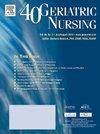Sleep quality types and influencing factors of frail elderly in long-term care facilities: A latent profile analysis
IF 2.4
3区 医学
Q3 GERIATRICS & GERONTOLOGY
引用次数: 0
Abstract
This study aims to investigate distinct categories of sleep quality among frail elderly residents in long-term care facilities using latent profile analysis and to analyze the factors influencing these categories. A convenience sample of 309 frail elderly individuals from three long-term care facilities in Xinjiang was surveyed between November 2023 and January 2024. Data were collected utilizing a general information questionnaire and the Pittsburgh Sleep Quality Index (PSQI). Latent class analysis was performed using Mplus 8.3 to identify subgroups. Three categories of sleep quality were identified: Good Sleepers (n = 125), Sleep Disturbance (n = 135), and Hypnotic Medication Users (n = 49). Multinomial logistic regression analysis revealed that chronic pain, the number of medications taken, and current smoking status significantly influenced sleep quality (P < 0.05). There is significant heterogeneity in sleep quality among frail elderly residents in care facilities. Healthcare professionals should be aware of the distinct characteristics of sleep quality in these subgroups and prioritize interventions for those with chronic pain, polypharmacy, and current smoking habits to improve their sleep quality.
长期护理机构中体弱老年人睡眠质量类型及影响因素:潜在剖面分析
本研究旨在探讨长期照护机构中体弱长者睡眠品质的不同类别,并分析影响这些类别的因素。本研究于2023年11月至2024年1月对新疆三家长期护理机构的309名体弱老年人进行了方便抽样调查。数据收集采用一般信息问卷和匹兹堡睡眠质量指数(PSQI)。使用Mplus 8.3进行潜在分类分析以确定亚组。将睡眠质量分为三类:睡眠良好者(125例)、睡眠障碍者(135例)和使用催眠药物者(49例)。多项logistic回归分析显示,慢性疼痛、服药次数和吸烟状况对睡眠质量有显著影响(P <;0.05)。护理机构中体弱老年人的睡眠质量存在显著的异质性。医疗保健专业人员应该意识到这些亚组中睡眠质量的独特特征,并优先对那些有慢性疼痛、多种药物和当前吸烟习惯的人进行干预,以改善他们的睡眠质量。
本文章由计算机程序翻译,如有差异,请以英文原文为准。
求助全文
约1分钟内获得全文
求助全文
来源期刊

Geriatric Nursing
医学-护理
CiteScore
3.80
自引率
7.40%
发文量
257
审稿时长
>12 weeks
期刊介绍:
Geriatric Nursing is a comprehensive source for clinical information and management advice relating to the care of older adults. The journal''s peer-reviewed articles report the latest developments in the management of acute and chronic disorders and provide practical advice on care of older adults across the long term continuum. Geriatric Nursing addresses current issues related to drugs, advance directives, staff development and management, legal issues, client and caregiver education, infection control, and other topics. The journal is written specifically for nurses and nurse practitioners who work with older adults in any care setting.
 求助内容:
求助内容: 应助结果提醒方式:
应助结果提醒方式:


